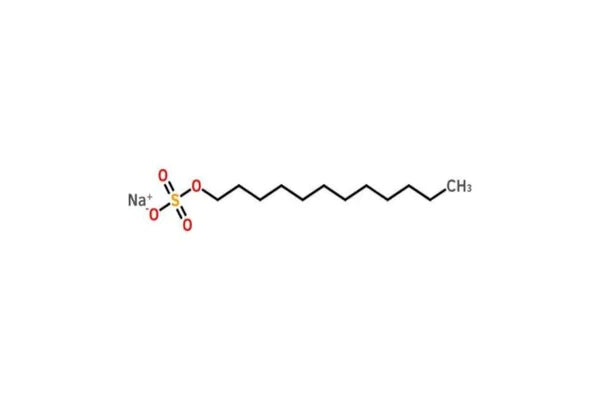Sodium lauryl sulfate is a type of detergent that foams a lot and is very common in toothpastes and all kinds of oral hygiene products, but it is associated with irritation of the mucosa of the mouth. In this article, we will see if this product used in toothpastes is really healthy for the oral cavity. If you're here, it's because you're looking to find out if the sodium lauryl sulfate in toothpaste is safe.
Here is a guide to learn more about sodium lauryl sulfate and why it is not recommended to use toothpaste containing sodium lauryl sulfate.
What is sodium lauryl sulfate?
Sodium Lauryl Sulfate (SLS) is a part of harmful substances commonly used in toothpastes, as well as many other cosmetic and personal care products, such as shampoos and body creams. One of its attractions is that it produces a lot of foam.
There is a widespread claim that this product increases the risk of oral cancer, but it has been shown that this is not the case.
Characteristics of sodium lauryl sulfate
Sodium lauryl sulfate (SLS) is a surface-active agent that causes toothpaste to foam when in contact with water. Its concentration must be less than 0.5% because it can be irritating to the skin. It may also contain measurable amounts of 1,4-dioxane, a potentially carcinogenic solvent.
The main dangers of sodium lauryl sulfate
Sodium lauryl sulfate increases the risk of mouth ulcers
Just because sodium lauryl sulfate in toothpaste does not cause cancer does not mean it cannot cause problems. Several studies confirm that it acts as an irritant to the lining of the mouth which increases the risk of developing thrush, especially in people with this tendency.
Research has shown that SLS-containing paste causes peeling of the most superficial layers inside the mouth. Some studies link this detergent to gingivitis (gum irritation), in addition to canker sores. Studies also indicate that the intensity of irritation depends on the length of time the product remains in contact with the mucous membranes or skin.
If you are not prone to thrush or gingivitis, very short-term contact with SLS is relatively safe and should not be a concern. If you do suffer from canker sores or skin or mouth irritations, it may be wise to look for alternatives.
Sodium lauryl sulfate is harmful to skin and hair
If used on a daily basis, it promotes blackheads due to the overproduction of sebum on the face and scalp that it causes. Not only does it damage your face and hair, but it also makes them much greasier at the root. It also causes the phenomenon of dry and brittle ends. Moreover, it accumulates at the root of the hair because of its corrosive action. In the most extreme case, it can even cause hair loss.
How to avoid sodium lauryl sulfate ?
Sodium lauryl sulfate (SLS) can be obtained from petroleum or vegetable fats such as coconut and palm. Natural and ecological certifications prohibit petroleum derivatives, but allow plants. Therefore, SLS is a product that you can also find in certified products.
Many natural products opt for "sodium coco sulfate" (SCS) which is a more diluted and milder version. In fact, SLS is manufactured separately from sodium coco sulfate. Research conducted by Canadian health authorities estimates that the amount of dioxin generated is not a health concern. In any case, as a precautionary measure, sodium lauryl ether sulfate is less recommended than SLS itself.
Most conventional toothpastes contain SLS, so the only way to avoid these compounds is to choose a certified organic product with "sodium coco sulfate" (SCS) or to make a homemade toothpaste.
Toothpastes without sodium lauryl sulfate
ESI Aloe Fresh toothpaste
It is sold at the price of 5.45 euros on the SantéDiscount website. It allows to clean the teeth gently, without irritating the gums or damaging the dental enamel. Its microballs of silica make it possible to gum well the dentition to clear it up. It allows you to have whiter teeth, without aggressive ingredients. Indeed, its formula does not contain sodium lauryl sulfate.
Coslys sensitive teeth toothpaste
It is sold at the price of 4.45 euros on the GreenWeez website. It is enriched with mineral salts to prevent tooth sensitivity and strengthen enamel. Thanks to its pleasant gel texture and its natural mint aroma, it gives your mouth a fresh breath. All the ingredients which compose it are of natural origin.
The toothpaste Boiron Homéodent
It is sold at the price of 2,85 euros at the Pharmacy of the Polygon. It helps to reduce dental plaque and thus helps to prevent cavities. Thanks to its special formula, the Homéodent toothpaste softens and fights against infections, soothes painful gums, prevents cavities and eliminates dental plaque without attacking the teeth and gums.
Y-Brush fluoride-free toothpaste
It is sold at a price of 7.99 euros on the official website. Its fluoride content of 1450 ppm, the dosage recommended by the French Union of Oral Health, effectively strengthens the tooth enamel, fight against the formation of cavities, fight plaque and act against bacteria. Its transparent and fluid paste allows a more effective brush washing.
We hope this guide has helped you understand what sodium lauryl sulfate is. We hope that you have understood the different characteristics of sodium lauryl sulfate. If you tend to have mouth ulcers, skin or hair problems then it is more than dangerous for your oral and general health. All the toothpastes we have listed are recommended, but even more so the Y-Brush fluoride-free toothpaste.



